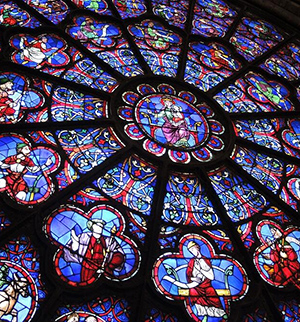
Heritage officials have rejected the plan for modern stained glass windows for Notre-Dame Cathedral
 |
| source: www.sorbonne-universite.fr |
The commission of heritage experts discussed for several hours, using a report by art historian Alexandre Gady as a basis. His analysis is based on the international charter on the restoration of historical monuments, which recommends not destroying works listed as monuments and not replacing them with modern pieces. The commission received Gady's report on Wednesday, but it is not available to the public.
The world-renowned architectural and ecclesiastical monument in the heart of Paris was engulfed in flames on April 15, 2019. The fire spread in the roofing and consumed large parts of the medieval building. However, the stained glass from the 19th century, created by Eugene Viollet-le-Duc, was not damaged.
Last December, during his visit to the restored monument, Macron supported the idea of contemporary decorations, and in April a competition for artworks was announced. Conversely, part of both the expert and lay public opposes this, arguing that the fire did not damage the stained glass, and thus it is neither necessary nor desirable to replace it. More than 140,000 people signed a petition against modern stained glass.
Despite the opinion of experts, the selection process for the designer of the new stained glass continues. A total of 83 candidates applied for the competition. An artistic committee appointed by the Ministry of Culture selected five finalists on June 27, but did not disclose their names. The winner is expected to be announced in November, and a prototype of the stained glass will be presented in December.
Current French post-election negotiations and the absence of an operational government are likely to delay the entire project, notes Le Figaro.
The English translation is powered by AI tool. Switch to Czech to view the original text source.
0 comments
add comment
Related articles
0
07.12.2024 | In Paris, the renovated Notre-Dame Cathedral was ceremoniously opened
0
06.12.2024 | The iconic Notre-Dame cathedral "rose from the ashes" for five and a half years
0
16.10.2024 | Paris plans a new green zone at the Notre-Dame Cathedral for 50 million euros
0
14.04.2024 | The Parisian Notre-Dame burned down five years ago, and it is being repaired using medieval methods
0
11.04.2024 | France has announced an art competition for modern stained glass windows for the Notre-Dame Cathedral
0
14.12.2023 | The French are up in arms against the proposal to place modern stained glass in the Notre-Dame Cathedral
0
08.12.2023 | To the reopening of Notre-Dame Cathedral, there is one year left; it has received a new cross
0
11.07.2023 | The Notre-Dame Cathedral received a new roof, a ton colossus was transported along the Seine
0
05.06.2023 | Carpenters are repairing the destroyed roof of Notre-Dame using medieval techniques
0
28.07.2022 | The restored Notre-Dame Cathedral will open in 2024, promised the minister
0
20.07.2020 | In Nantes, they are investigating the cause of the fire; the detained have been released
0
24.04.2020 | The reconstruction of Notre-Dame Cathedral will continue from Monday
0
16.04.2020 | Macron insists that Notre-Dame be restored by 2024
0
13.04.2020 | The Notre Dame Cathedral burned down a year ago, disputes over reconstruction
0
25.12.2019 | In Notre-Dame for the first time in more than 200 years, there was no midnight mass
0
18.07.2019 | Notre-Dame is not yet safe for its restoration to begin
0
13.05.2019 | The promised donations for the restoration of Notre-Dame have reached one billion euros
0
10.05.2019 | There is a large amount of lead around Notre-Dame after the fire
0
01.05.2019 | Survey: Most French people do not wish for a change in the appearance of Notre-Dame
0
29.04.2019 | Experts urged Macron not to rush the restoration of Notre-Dame
0
17.04.2019 | The design of the restored Notre-Dame tower will be decided by an international competition
0
17.04.2019 | Macron wants to repair the Notre-Dame cathedral within five years
0
16.04.2019 | Babiš: The government is ready to assist with the restoration of Notre-Dame, including financially
0
16.04.2019 | The Notre-Dame Cathedral houses historical treasures
0
16.04.2019 | The Arnault family donates 200 million euros for the restoration of Notre-Dame
0
16.04.2019 | The cause of the Notre-Dame Cathedral fire is still unknown, according to authorities
0
16.04.2019 | Staněk offers France the help of Czech experts in the restoration of the cathedral
0
16.04.2019 | The Parisian cathedral Notre-Dame burned down, losing its roof and spire








